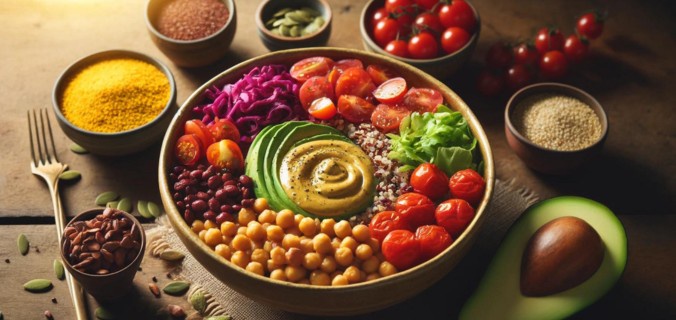Introduction:
In recent years, the vegan lifestyle has gained widespread popularity, driven by growing concerns about health, animal welfare, and environmental sustainability. More than just a dietary choice, transitioning to a vegan lifestyle represents a profound shift in mindset and values. In this blog post, we'll explore the multifaceted benefits of embracing a vegan lifestyle, offering insights and practical tips to empower you on your journey towards a healthier, more compassionate way of living.
Health Benefits of a Vegan Lifestyle:
- Improved Heart Health: A vegan diet, devoid of animal products such as meat, dairy, and eggs, is naturally low in saturated fat and cholesterol. Studies have shown that adopting a vegan lifestyle can lower blood pressure, reduce cholesterol levels, and decrease the risk of heart disease.
- Weight Management: Plant-based foods tend to be lower in calories and higher in fiber than animal-based foods, making them ideal for weight management. By focusing on whole, minimally processed plant foods, you can achieve and maintain a healthy weight more easily.
- Reduced Risk of Chronic Diseases: Research suggests that a vegan diet may help lower the risk of chronic diseases such as type 2 diabetes, certain cancers, and hypertension. The abundance of antioxidants, phytonutrients, and fiber found in plant foods can help protect against cellular damage and inflammation.
Environmental Benefits of a Vegan Lifestyle:
- Reduced Carbon Footprint: Animal agriculture is a leading contributor to greenhouse gas emissions, deforestation, and water pollution. By eliminating animal products from your diet, you can significantly reduce your carbon footprint and lessen the environmental impact of your food choices.
- Conservation of Natural Resources: Producing plant-based foods requires fewer resources, including land, water, and energy, compared to raising animals for food. Transitioning to a vegan lifestyle helps conserve precious natural resources and promotes ecological sustainability.
- Preservation of Biodiversity: Livestock farming and deforestation for grazing and feed crops are major drivers of habitat loss and species extinction. By choosing plant-based foods over animal products, you can contribute to the preservation of biodiversity and the protection of endangered ecosystems.
Tips for Transitioning to a Vegan Lifestyle:
- Start Gradually: Transitioning to a vegan lifestyle is a journey, not a destination. Begin by gradually reducing your consumption of animal products and incorporating more plant-based foods into your meals. Experiment with new recipes and flavors to discover delicious vegan alternatives to your favorite dishes.
- Educate Yourself: Take the time to educate yourself about the nutritional aspects of a vegan diet and how to ensure you're meeting your nutrient needs. Learn about plant-based sources of protein, iron, calcium, vitamin B12, and omega-3 fatty acids, and incorporate them into your meals to maintain optimal health.
- Find Support: Seek out support from friends, family, or online communities who share your interest in veganism. Surrounding yourself with like-minded individuals can provide encouragement, inspiration, and practical tips to help you navigate the challenges of transitioning to a vegan lifestyle.
FAQs (Frequently Asked Questions):
Q: Will I get enough protein on a vegan diet?
A: Yes, it's entirely possible to meet your protein needs on a vegan diet by including plant-based sources such as beans, lentils, tofu, tempeh, nuts, seeds, and grains in your meals.
Q: How can I ensure I get enough calcium without dairy?
A: Calcium-rich plant-based foods include leafy greens like kale and collard greens, fortified plant milks, tofu, almonds, and sesame seeds. Aim to include a variety of these foods in your diet to ensure adequate calcium intake.
Q: Is a vegan diet suitable for children and pregnant women?
A: Yes, a well-planned vegan diet can provide all the nutrients necessary for children and pregnant women. However, it's essential to pay attention to nutrient needs and consult with a healthcare professional or registered dietitian for personalized guidance.
Conclusion:
Embracing a vegan lifestyle change is not only beneficial for your health and the planet but also for the animals who share our world. By making mindful choices about the foods we eat, we can contribute to a more compassionate and sustainable future for generations to come. Whether you're motivated by health concerns, environmental consciousness, or a desire to live in alignment with your values, transitioning to a vegan lifestyle offers a path towards greater well-being and positive change.


No comments yet